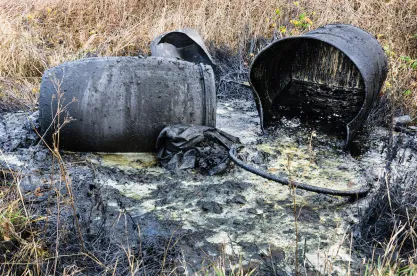Wisconsin Manufacturers and Commerce (WMC), the statewide chamber of commerce, and Leather Rich, a dry cleaning business in Oconomowoc, recently filed a lawsuit in Waukesha County challenging the Wisconsin Department of Natural Resources’ (DNR’s) policies related to per- and polyfluoroalkyl substances (PFAS).
In the lawsuit, WMC and Leather Rich take issue with these two PFAS policies:
-
Regulating PFAS as a hazardous substance
-
Interpreting the Wisconsin Voluntary Party Liability Exemption (VPLE) statute to allow for a “limited” Certificate of Completion (COC), which restricts the availability of site closure to only hazardous substances that have actually been investigated
With PFAS at the forefront of DNR’s and other regulators’ attention, some businesses have been frustrated by changes made by DNR to the scope of its investigations and the rules of the VPLE program. Often, these changes have come after businesses have worked with DNR for several years to remediate their sites and seemed to be approaching the end of the process.
In the lawsuit, WMC and Leather Rich allege that DNR’s PFAS-related policies violate the administrative rulemaking process in the following ways:
-
DNR improperly supplements its designations of hazardous substances under Wis. Stat. § 292.01(5), leading it to require testing and remediation based on standards that have not gone through rulemaking.
-
Under VPLE, parties may conduct an investigation and remediation under DNR's oversight and ultimately obtain a COC, which exempts the party and site from future environmental liability, allowing the site to be redeveloped and sold. Under its new policy, however, DNR no longer offers COCs to cover emerging contaminants, such as PFAS, that may exist at the site at the time of entry into the VPLE program and that have not been investigated but could be discovered in the future.
The new VPLE policy is a change to DNR’s historical practice, under which COCs covered any future environmental contamination, known or unknown. This change ultimately narrows the scope of liability protection to specific substances that were actually investigated. In certain circumstances, even if a Phase 1 PFAS investigation would not suggest that PFAS could be present, the DNR has required PFAS to be included in testing and remediation for coverage under the VPLE program. This can be problematic for two reasons:
-
The Phase I investigation would not suggest a need to test for PFAS
-
If testing for PFAS were to occur and be discovered, there are no current groundwater standards that have been developed by DNR to determine the appropriate level of cleanup
POTENTIAL IMPACTS OF THE LAWSUIT
Discharges of hazardous substances must be reported under the Wisconsin Spills Law and can result in an investigation and remediation requirements imposed by DNR. The plaintiffs in this case seek an order that DNR cannot add new hazardous substances without going through rulemaking, a cumbersome process that can take years. This ruling would upend many years of established practice by DNR and make it difficult and time-consuming to add new hazardous substances.
If the plaintiffs prevail on their challenge to DNR’s VPLE policy, DNR could be prevented from limiting closure to only sites that have been investigated for PFAS. However, it would not necessarily make it easier for companies to obtain COCs through the VPLE program. DNR has discretion to administer the VPLE program and grant COCs, and it may simply stop granting most COCs altogether.
HEIGHTENED SCRUTINY ON PFAS CHEMICALS IN WISCONSIN
The WMC lawsuit against DNR comes on the heels of Governor Tony Evers announcing that the State of Wisconsin will hire a private law firm to potentially pursue claims against companies that have contributed to PFAS contamination in the state. It remains unclear how quickly this process will move or who may be targeted by the state, but it is a sign that Wisconsin is likely to ramp up its efforts against companies who may have disposed of, used or made products containing PFAS.
Even more recently, the City of La Crosse filed a lawsuit against 23 companies alleging that they caused or contributed to PFAS contamination of drinking water wells in the La Crosse area. These developments suggest that the prevalence of PFAS will continue to impose costs and uncertainty on businesses.




 />i
/>i

